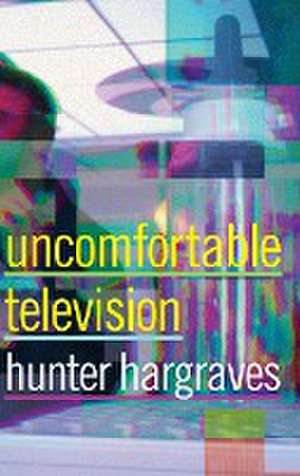Uncomfortable Television
Autor Hunter Hargravesen Limba Engleză Hardback – 19 ian 2023
| Toate formatele și edițiile | Preț | Express |
|---|---|---|
| Paperback (1) | 166.45 lei 3-5 săpt. | +14.58 lei 7-13 zile |
| Wiley – 19 ian 2023 | 166.45 lei 3-5 săpt. | +14.58 lei 7-13 zile |
| Hardback (1) | 568.40 lei 3-5 săpt. | +21.53 lei 7-13 zile |
| MD – Duke University Press – 19 ian 2023 | 568.40 lei 3-5 săpt. | +21.53 lei 7-13 zile |
Preț: 568.40 lei
Preț vechi: 738.17 lei
-23% Nou
108.78€ • 113.27$ • 91.93£
Carte disponibilă
Livrare economică 15 februarie-01 martie
Livrare express 01-07 februarie pentru 31.52 lei
Specificații
ISBN-10: 1478016930
Pagini: 264
Dimensiuni: 152 x 229 x 17 mm
Greutate: 0.52 kg
Editura: MD – Duke University Press
Notă biografică
Cuprins
Introduction: Television Scripts 1
1. The Irritated Spectator: Affective Representation in (Post)millennial Comedy 27
2. The Addicted Spectator: TV Junkies in Need of an Intervention 57
3. The Aborted Spectator: Affective Economies of Perversion in Televisual Remix 89
4. The Spectator Plagued by White Guilt: On the Appropriative Intermediality of Quality TV 121
5. The Woke Spectator: Misrecognizing Discomfort in the Era of “Peak TV” 162
Notes 197
Bibliography 219
Index 239
Descriere
From The Wire to Intervention to Girls, postmillennial American television has dazzled audiences with novelistic seriality and cinematic aesthetics.
Yet this television is also more perverse: it bombards audiences with misogynistic and racialized violence, graphic sex, substance abuse, unlikeable protagonists, and the extraordinary exploitation of ordinary people.
In Uncomfortable Television, Hunter Hargraves examines how television makes its audiences find pleasure through feeling disturbed. He shows that this turn to discomfort realigns collective definitions of family and pleasure with the values of neoliberal culture. In viscerally violent dramas, cringeworthy ironic comedies, and trashy reality programs alike, televisual unease trains audiences to survive under late capitalism, which demands that individuals accept a certain amount of discomfort, dread, and irritation into their everyday lives.
By highlighting how discomfort has been central to the reorganization and legitimization of television as an art form,
